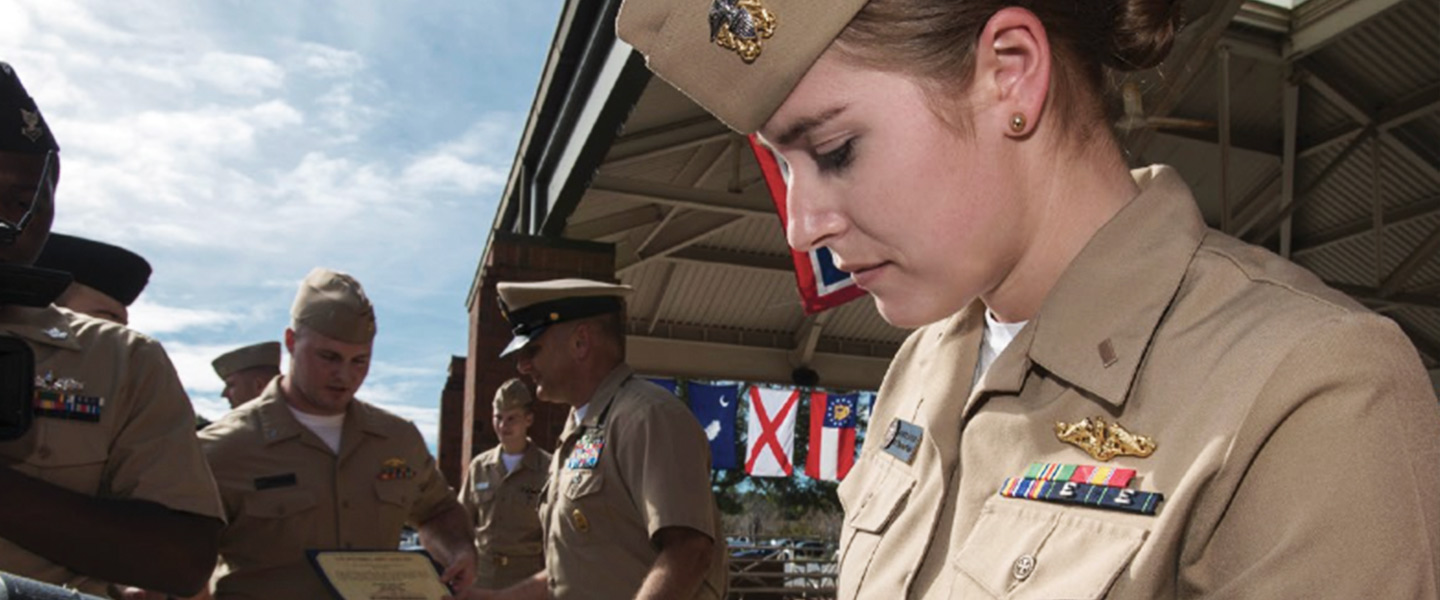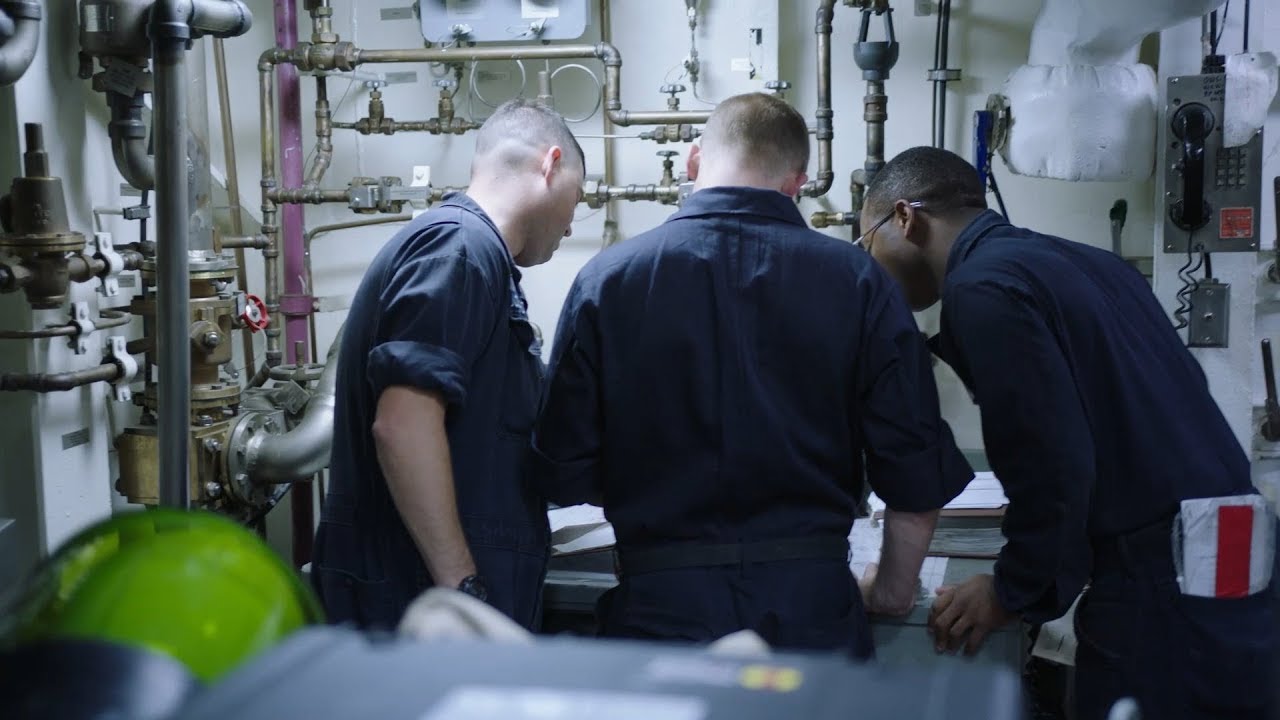What to Expect
More Information
Responsibilities
Naval Reactors Engineers have oversight of the Navy's entire fleet of nuclear-powered ships as well as shore-based prototypes and nuclear propulsion support facilities for America’s Navy. The wide array of technical areas involved in the Naval Nuclear Propulsion program include:
- Reactor and fluid systems design
- Reactor physics
- Materials development
- Component design such as steam generators, pumps and valves
- Instrumentation and control of reactor, steam and electric plants
- Testing and quality control
- Shielding
- Chemistry and radiological controls
As a Navy Reactors Engineer stationed at Naval Reactors Headquarters in Washington, D.C., you will provide technical oversight while managing projects ranging from reactor design to fleet operations to de-fueling and decommissioning warships.
Work Environment
Preliminary training and eventual staff assignments center around Naval Reactors headquarters at the Navy Yard in Washington, D.C. At headquarters, you will be a part of a stream-lined, elite staff of roughly 500 people who oversee the entire Naval Nuclear Propulsion Program from cradle-to-grave.
Even junior level Naval Reactors Engineers assume responsibility for key technical work in a variety of state-of-the-art facilities, including:
- Two Department of Energy laboratories
- Two nuclear prototype/training sites
- Nearly 100 nuclear-powered ships and submarines
- Six shipyards
- More than 1,000 firms that support the Naval Reactors Program
Training & Advancement
Upon graduation from college, the formal training process of becoming an officer in the Naval Nuclear Propulsion program is officially underway. For those pursuing a Naval Reactors Engineer position, the first step is Officer Development School (ODS) in Newport, RI – a 5-week course of instruction in Newport, RI, that provides a comprehensive and intense introduction to the responsibilities of being a Naval Officer.
Upon completion of ODS, newly commissioned Ensigns move on to receive initial training at Naval Reactors Headquarters in Washington, D.C. (9 weeks of instruction) and Nuclear Power Training Unit (2 weeks of instruction) that form the basis for more advanced academic work. Officers then attend Bettis Reactor Engineering School (BRES), a 6-month postgraduate-level education in nuclear engineering at Naval Nuclear Labs just outside Pittsburgh, PA. This is followed by approximately three weeks spent gaining a working background at one of the Navy’s shipyards in either Newport News, VA, or Bremerton, WA.
Following the training pipeline, Naval Reactors Engineers are then assigned a Nuclear Engineer position with the group responsible for managing all technical aspects of the Naval Nuclear Propulsion program—reviewing, approving and confirming the design, operation and maintenance of nearly 100 nuclear reactors. Continuing education is required for the next six months as Engineers start in a junior role under a supervisor and rapidly advance to take on increasing responsibilities and complete their 5-year commitment.
Post-Service Opportunities
As a Naval Reactors Engineer, you will have incredible post-service prospects. The highly-selective nature of the program combined with world-class advanced training and qualifications means your skills and knowledge are in high demand. Adding "Navy Nuke" to your list of accomplishments will make you a top candidate for a variety of future careers including civilian engineering and management jobs after you complete your service.
Education Opportunities
In addition to the best-in-class training and state-of-the-art facilities, current undergrad students who meet the prerequisite background will also get the chance to get paid while finishing school through the Nuclear Propulsion Officer Candidate (NUPOC) program. Students in majors like mathematics, engineering, physics and chemistry may receive preferred acceptance into the program.
If accepted into the NUPOC program as an aspiring Naval Reactors Engineer, you can:
- Receive a salary in excess of $4,000 per month for up to 18 months prior to your college graduation
- Receive an immediate one-time sign-on bonus of $15,000
- Enjoy military health care benefits while you are a student in the program
- Have your college years enrolled in the program count towards retirement
- Be a full-time student with no military duties while in college
Interested candidates should connect with a recruiter and ask about joining an engineer-specific Q&A information session. This will help you learn more about what the job entails and get answers for any of your questions.
Postgraduate Education Opportunities
As a Naval Reactors Engineer, once you’re out of school you’ll have a position waiting as a respected professional and Officer affiliated with the most accomplished nuclear program on earth. Beyond undergraduate and formal Navy training and education, you can pursue additional graduate education by:
- Completing Joint Professional Military Education (JPME) at one of the various service colleges
- Using Tuition Assistance to attend online or in-person graduate programs during shore assignments.
- Navy College Program
- VOLED Assistance Center
- VOLED Region Advisors
- The Naval Postgraduate School (NPS)
- Navy War College (NWC)
- USAF Air University Air Command and Staff College
Qualifications & Requirements
Because of the demanding nature of Naval Nuclear Propulsion Program and the magnitude of the responsibilities members will take on from a young age, requirements to become a candidate and join NUPOC are stringent.
The NUPOC program is open to both men and women. The following program qualification criteria apply.
To be an eligible candidate, you must:
- Be a U.S. citizen (dual citizens must renounce non-US citizenship)
- Be at least 19 years of age and less than 29 years of age at the time of commissioning—waivers up to 40 years of age for select jobs may be available
- Meet any additional physical standards of the Navy
Education Requirements
Candidates must be graduates or students of an accredited college or university in the United States or in a United States territory pursuing a BA, BS or MS (preferably major in mathematics, engineering, physics, chemistry or other technical areas). Those still in school may apply as early as 18 months from completion of an undergraduate degree for Naval Reactors Engineers. Applicants may also join the NUPOC program as early as 12 months from completion of a master's degree. Additional academic requirements include:
- Completed one academic year of calculus
- Completed one academic year of calculus-based physics
- A competitive GPA and a minimum grade of "B" in all technical courses
General qualifications may vary depending upon whether you’re currently serving, whether you’ve served before or whether you’ve never served before.
Part-Time Opportunities
There are no part-time jobs as a Navy Reserve Sailor in this role. Go back to Careers to find other jobs that have a Reserve component. You can also find out more about what life is like as a Reserve Sailor in the Navy.

































































































































